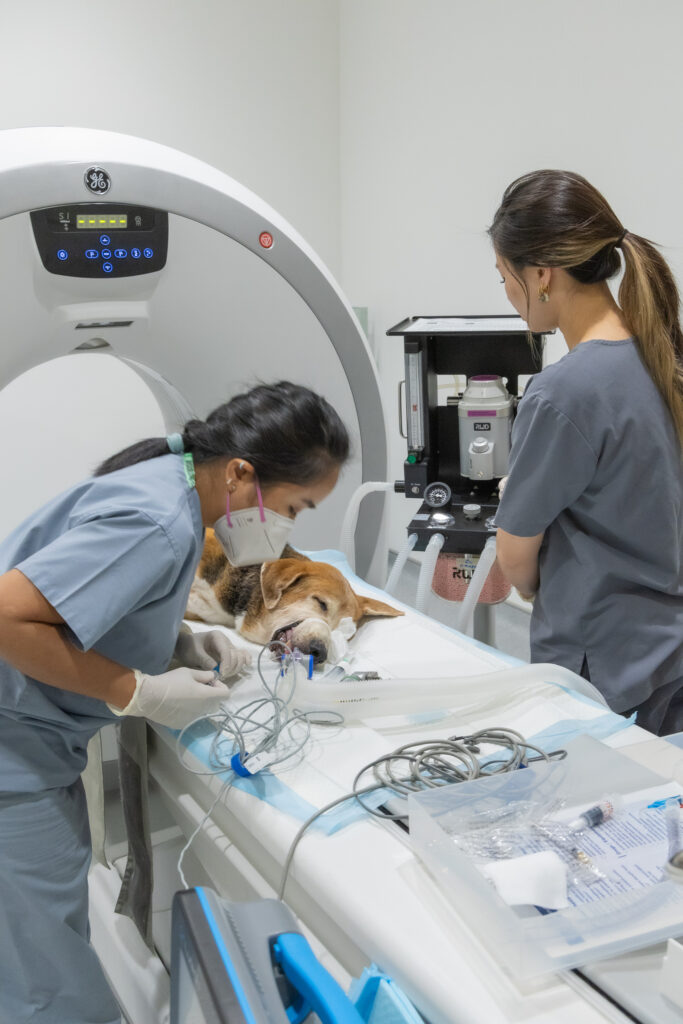

The Beecroft surgery team is headed by Dr Patrick Maguire who is a Diplomate of the American College of Veterinary Surgeons. He has more than 10 years of surgical experience and at the hospital he is supported by a full staff of interns, critical care veterinarians, and licensed veterinary technicians.
In addition, our state-of-the-art diagnostic imaging service and cutting edge rehabilitation team help our patients recover safely and return to a high quality of life through post-operative therapy and monitoring.

Interventional Radiology (IR) for Pets

Dr Tanja Vedel is a European board-certified specialist in veterinary diagnostic imaging, dedicated to providing advanced diagnostic services to support optimal patient care. Her expertise spans radiology, ultrasound, computed tomography (CT), magnetic resonance imaging (MRI) and nuclear medicine, offering comprehensive imaging solutions for complex medical and surgical cases.
Interventional radiology (IR) offers an approach to veterinary care, using imaging technologies like ultrasound to guide minimally invasive procedures. This allows specialists to diagnose and treat a wide range of conditions with greater precision and less discomfort for your felines or canines.
By harnessing the power of real-time imaging, such as MRI and CT scans, IR provides targeted treatments, often reducing the need for traditional surgery and promoting faster recovery times.

At Beecroft, our dedicated team of veterinary specialists, including those trained in veterinary abdominal ultrasound, work together to provide the highest standard of care through IR, ensuring your companion receives the most advanced and compassionate treatment available.
Our team of specialists may employ the following veterinary imaging technologies to visualise the inside of your pet’s body and guide minimally invasive procedures:
Interventional Radiology allows us to offer a range of minimally invasive procedures, often providing an alternative to traditional surgery. Here are some of the common IR procedures we perform at Beecroft:
IR procedures are less invasive than traditional surgery, which means less pain for your pet and faster recovery times.
Precision
Real-time imaging allows for precise targeting of treatment areas, which improves outcomes and minimises damage to surrounding tissues.
Many IR procedures require shorter hospital stays than traditional surgery.
There is reduced risk of complications such as infections and bleeding due to smaller incisions and targeted interventions.
Beecroft is proud to be one of the leading animal hospitals in Singapore, offering IR services. Our team of experienced specialists is committed to providing your pet with the highest-quality care.
Please consult your veterinarian to discuss if an IR technique may be suitable for your pet.
IR can benefit many pets, including canines, felines, and even some exotic animals. However, the suitability of IR depends on the specific condition and your pet’s overall health. Our team will carefully assess your companion to determine if IR is the right option.
Both MRI and CT scans provide valuable diagnostic information, but they differ in how they create images. MRI uses a magnetic field and radio waves to produce detailed images of soft tissues, while CT uses X-rays to create cross-sectional images of bones and organs. Our veterinary specialists will recommend the most appropriate imaging modality based on your pet’s needs.
Minimally invasive procedures like those offered through IR often involve smaller incisions, less pain, and faster recovery times compared to traditional surgery. There may also be a reduced risk of complications such as infection and bleeding.
While generally safe, IR procedures do carry some risks, as with any medical intervention. These risks can include bleeding, infection, or complications related to anaesthesia. Our experienced team takes every precaution to minimise these risks by using sterile techniques, advanced imaging guidance, and careful monitoring throughout the procedure.
Ultrasound uses sound waves to create real-time images of internal organs. This allows our specialists to visualise the area being treated and guide instruments precisely, ensuring accurate placement and minimising the risk of damage to surrounding tissues.
Ultrasound is a versatile diagnostic tool that can help identify a wide range of conditions, including: